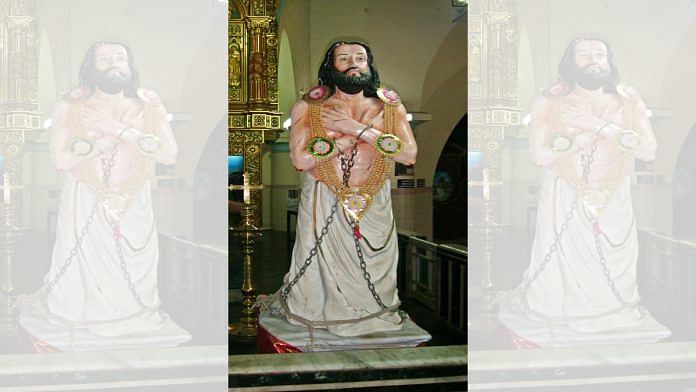New Delhi: An 18th century anti-caste champion, Devasahayam Pillai, has become the first Indian layman to be declared a saint by the Vatican.
Born into a Hindu family in a deeply caste-ridden society, Devasahayam was named Nilakandan by his parents Vasudevan Namputhiri and Devika Amma. This was 1712 in present-day Kanyakumari.
He began his career in the royal palace of King Marathanda Varma as a treasurer and came in close contact with several Dutch officials at the palace. Being influenced by one Dutch naval commander in particular, he was baptised into Christianity on 14 May, 1745.
According to the Vatican news service, he was given the name Devasahayam that corresponded to the Biblical name of ‘Lazarus’.
His conversion, however, was considered “an act of treason and a danger to the stability of the kingdom”. But Devasahayam received the sacraments regularly, and “ate with people of lower caste than himself and of very humble status”, the Vatican news service said.
A note prepared by the Vatican added: “While preaching, he particularly insisted on the equality of all people, despite caste differences. This aroused the hatred of the higher classes, and he was arrested in 1749. After enduring increasing hardships, he received the crown of martyrdom when he was shot on 14 January 1752.”
According to religious lore, Devasahayam was dragged from one village to another in the last seven months before his death. He was finally shot on the midnight of 14 January, 1752 at the Aralvaimozhy forest.
It is said that local Christians collected his remains after five days of his death and buried it in the present-day Cathedral of Saint Francis in Kottar, Nagercoil. From that day on, Devasahayam has been considered a martyr.
He was beatified in 2012 by Pope Benedict XVI. He was chosen for sainthood in 2013 when a woman in her seventh month of pregnancy testified to a “miracle” after praying to him.
Her fetus, reportedly, stopped moving in the 24th week. The mother, who was a Catholic and devoted to Lazarus, began to pray for his help. Within an hour, she felt the baby kicking. Tests also showed a regular heartbeat. The infant was eventually born without complications.
This was recognised as a miracle by Pope Francis in 2014, clearing the path for his canonization, reported news agency PTI.
On Sunday, the Pope declared Devasahayam a saint during the Canonisation Mass in St Peter’s Basilica, which was attended by over 50,000 people from all over the world, including government delegations.
Besides Devasahayam, the Pope proclaimed five other men — Titus Brandsma, Cesar de Bus, Luigi Maria Palazzolo, Giustino Maria Russolillo, and Charles de Foucauld — and four women — Maria Rivier, Maria Francesca of Jesus Rubatto, Maria of Jesus Santocanale, and Maria Domenica Mantovani — as saints.
“This sainthood is an invitation for us to live and lead a life free of discrimination,” said Father John Kulandai, who attended the canonisation at the Vatican as a key member of the Kanyakumari team that worked on this matter.
The original invitation from the Vatican had mentioned Devasahayam’s former caste “Pillai”. The Vatican removed it following protests that adding the caste name defeated the purpose of what Devasahayam stood for.
“Saint Devasahayam stood for equality and fought against casteism and communalism. His sainthood comes at a time when India is facing a surge in communalism,” said retired IAS officer M.G. Devasahayam, who had written to the Vatican, asking it to remove Devasahayam’s caste name.
Also read: ‘Will you demolish 80% of Delhi,’ asks Kejriwal of BJP-led civic drive to remove encroachment



